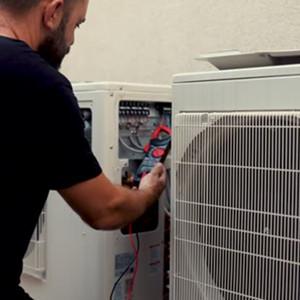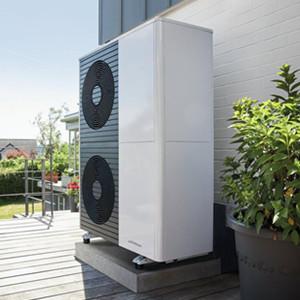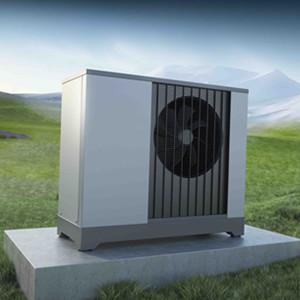Does an Air Source Heat Pump add Value?
Homeowners can add value to their home in a number of ways.
One of the ways is to improve the energy efficiency of your home. This can be achieved in a few different ways, one of which might be installing a heat pump. But is it worth adding or upgrading your heat pump?
Will a heat pump add value to your home? It depends on your definition of value. A new heat pump may increase the monetary value of your home, but not as much as you might think. Having a heat pump in your home is no longer considered a luxury. Having an old heat pump can sometimes hurt you far more than a new one can help you. People look forward to it. Typically, a new heat pump may recover 35% to 50% of its market value of its initial cost. However, in some cases, it can be a break-even investment that can add value to your home equal to its initial cost.
In the first statement above, I said it depends on your definition of value. Value can be a return on monetary value, but it can also be an unmeasurable return on investment that cannot be measured in monetary terms.

How much value can a heat pump add to your home?
Recent data suggests that installing an air source heat pump in your home does add to its value.
Air source heat pumps can add nearly 7% to the value of an average home.
Nearly 50 percent of states inspected the price of roughly 500,000 homes, and air source heat pumps added an average of about $10,000 to $17,000 to home values.
Just like a home with solar panels has a higher value on the for-sale market, a home with an air source heat pump is equipped with a level of energy efficiency that can increase its value.
While it is statistically possible that home values will increase by more than installation costs, there is never a guarantee that home values will increase.
However, there are many other benefits of installing an ASHP system, such as reducing a home's carbon usage and relying on renewable energy for heating or cooling.
Why can an air source heat pump increase the value of a home?
Air source heat pumps add value to a home because they are environmentally friendly. The value and demand for homes that consume energy in a way that reduces our carbon footprint is growing as more research urges homeowners to make energy-efficient choices.
Over the past 25 years, electricity costs have risen by about 2% per year.
Compared to other standard heating systems, an air source heat pump can provide your home with three times more heat than it uses.
For example, our air source heat pump has a coefficient of performance (COP) of over 3, which means that for every 1 unit of electrical energy it consumes, it produces over 3 units of energy.
This makes air source heat pumps the perfect energy-efficient home solution to energy problems and increasing consumption of natural resources. Replacing a standard HVAC system with an air source heat pump can save $300 to $500 per year.
Not only that, but the increase in your home's value is still more significant than the average installation cost, which ranges from $6,000 to $8,000, making an ASHP installation a worthwhile investment in many cases.
How Air Source Heat Pumps Work
Air source heat pumps differ from traditional HVAC systems in many ways. On the one hand, standard heating and cooling systems typically generate heat by burning fuel or consuming electricity.
Air source heat pumps do not generate heat directly. Instead, it transfers existing heat from the outside air into your home.
Here's how an air source heat pump works:
1. The system contains a compressor with coils to aid in heat transfer. When heated, an external coil with refrigerant absorbs heat from the outside air flowing by and boils it into a gas.
2. The gas is pushed through the compressor to further increase the pressure and thus heat.
3. The heat is released internally for central heating or even domestic hot water.
4. By releasing heat, the gas turns back into a liquid and the cycle repeats.
5. A valve located near the compressor can redirect the heat flow between the coils so that the pump can be used for both heating and cooling purposes.
Different Types of Air Source Heat Pumps
Like most heating and cooling systems, there are several subtypes of air source heat pumps.
If you're considering buying an air source heat pump, here's a quick breakdown of all the different types:
1. Air-to-air: The first type of air-source heat pump was the classic air-to-air. In this system, the heat source comes directly from the outside air. Thermal energy is extracted from the air, converted and pushed into your home.
2. Air-to-Water: This type of air-source heat pump functions similarly to an air-to-air pump, with one key difference. The heat from this pump is not released into your home as air, but is pushed through a central hot water system that also supplies your home with hot water for showers and dishes.
Our air source heat pumps are the air to water type.
1. Ductless: Ductless air source heat pumps are one of the easiest systems to install. Hence its name, it doesn't require plumbing, which means you can more easily add one to your home if it isn't already installed.
2. Split: As mentioned above, an air source heat pump consists of two coils. In a split system, the coils are located inside and outside. Heat is released through fans and ducts.
3. Packaging: In this type of pump, both coils are located outside the system. The air produced is dispersed through ducts, usually within walls.
4. Multi-zone: Multi-zone pumps are probably the most complex but also the most programmable type. The system includes several coils distributed in different areas, allowing other rooms to be cooled or heated to different temperatures.
Can an air source heat pump add value to a house?
Installing an air source heat pump in your home adds value to it statistically, and on average, the added value exceeds the cost of installation.
Heat pumps should be considered a long-term investment. In addition to other green measures, they can reduce your energy bills and may be seen as a positive when selling your home. Read our page Why should I consider a heat pump to learn more about the benefits of a heat pump system.





